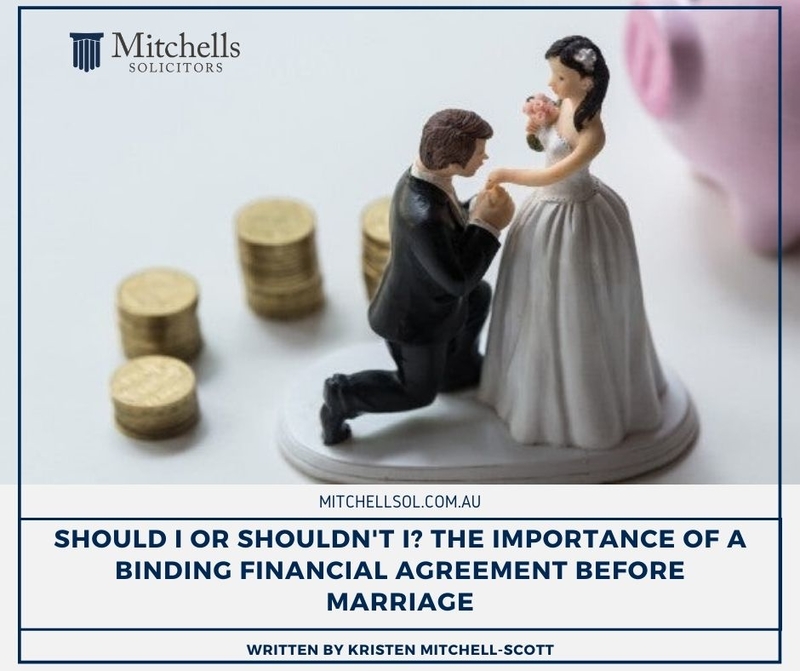Should I or Shouldn’t I? The Importance of a Binding Financial Agreement before Marriage
Call it pre-wedded bliss or, going back further, pre-engagement bliss or even, the happier side of Family Law – the moment when you go to your lawyer and tell them you’re going to be married soon or you’re contemplating marriage and you’ve heard of a Pre-Nup. You want to know if it would be worth your while to do one. The answer is a resounding yes! Then come the questions – some of which appear below.
What is a Pre-Nup?
The word ‘pre-nup’ is so often heard in American legal dramas. In Australia, the correct terminology is a Binding Financial Agreement – this document sets out the assets, liabilities and (if relevant) any financial resources of each party, and describes how they are to be dealt with in the event of a separation.
It is for the lawyer to ensure that the document is drafted in accordance with the appropriate section of the Family Law Act 1975 (Cth) (FLA). If you are contemplating marriage or are about to get married and do not satisfy the requirements of a de facto relationship, being that you have lived together for a period of two (2) years, your agreement will fall under s 90B FLA.
What seems to be most common nowadays, are binding financial agreements drafted under two sections of the FLA. For example, if you are contemplating marriage but are also de facto partners, then your agreement will fall under both ss 90UC and 90B FLA. That is not to say that parties entering a de facto relationship with no intention of getting married should not seek legal advice regarding the drafting of a Binding Financial Agreement under s 90UB FLA, however, that is not the topic of this article.
Can’t I just discuss that with my partner? If we agree, why do we need it in writing?
A Binding Financial Agreement is, essentially, a contract. Therefore, as in contract law, it is always best to have such an agreement in writing, to protect both parties. If it is solely a verbal agreement, then should the relationship actually break down in the future, you have nothing to refer back to. It then becomes a ‘he said’ / ‘she said’ fight, which is never a good idea.
Of course, you are encouraged to discuss these matters with your partner. It is not the most romantic discussion to have, but nonetheless, it is necessary.
Further, both of you will need to seek independent legal advice on the effects, advantages and disadvantages of a Binding Financial Agreement. The lawyer who drafts the Agreement can provide that advice to their client, but the other party must seek advice from another lawyer at another law firm.
I’ve heard Binding Financial Agreements can be set aside – is that true?
Yes, but only in very particular circumstances. Your lawyer will advise you about the disadvantages of a Binding Financial Agreement, one of which includes the risks associated with drafting one. These include:
- The Court does not oversee or regulate the actual drafting of a Binding Financial Agreement, and only considers the Agreement’s terms if one party seeks to have it set aside;
- Depending on the legal advice a party receives, they may be unhappy with particular terms of the Binding Financial Agreement which could lead to disputes and may ultimately defeat the purpose of the Agreement; and
- A Binding Financial Agreement, by its nature, is complex and requires considered drafting. Accordingly, in some cases, it can be quite an expensive exercise, particularly if negotiations mean changes need to be made. Your lawyer will advise you to consider various potential scenarios including whether you and your partner / fiancée will have children down the track, and how that will affect the separation of their assets should they separate.
A Binding Financial Agreement, like a contract, can be set aside for a number of reasons, including:
- If, since the finalisation of the Agreement, a substantial and material change in circumstances has made it so;
- The Agreement becomes unenforceable (for example, asset loss means that certain clauses cannot be effected); or
- If the terms of the Agreement were followed, it would cause significant financial hardship to one of the parties, or it would unreasonable for the entire Agreement or a particular part of it to be carried out;
- If, at the time of executing the Agreement, one party’s conduct was unconscionable;
- The Agreement was obtained by fraud – which includes failure to disclose relevant material such as particular assets;
- If the Agreement does not deal adequately or correctly with a superannuation interest; or
- If the Agreement becomes unenforceable, void or voidable – all of which are contract law terms about which your lawyer can provide advice.
Despite the mentioned disadvantages and risks, a Binding Financial Agreement is a great tool to provide all parties with comfort in the knowledge that their assets will be protected in the event of a separation. In discussion with your partner, you are able to determine what you consider best for both of you and this can be tweaked by your lawyer for your protection, if necessary.
Such an Agreement also benefits those who enter a marriage with significant assets and the potential to receive an inheritance down the track. Depending on the terms of the Agreement, your partner will not be able to claim anything which they have acknowledged is (or is to be) yours and agreed that you will keep, in the event of separation. Additionally, the Agreement can assist in determining how your joint assets, that you intend to accumulate throughout the relationship are to be dealt with.
There are also benefits for you in the future should separation occur. Having a Binding Financial Agreement at the beginning of your relationship means that the post-separation arguments around property and finances are unlikely to occur and makes that process a lot less stressful. You can also expect to find relief from stamp duty and capital gains tax with transactions pursuant to a Binding Financial Agreement.
If you would like advice and assistance with a Binding Financial Agreement prior to marriage, please contact Kristen Mitchell-Scott of Mitchells Solicitors on (07) 3373 3633 or via email on kmitchellscott@mitchellsol.com.au.

Kristen Mitchell-Scott is part of the Mitchells Solicitors family law team, and holds dual degrees in Bachelor of Laws (Honours) and Bachelor of Arts, majoring in Japanese and Criminology from the University of Queensland, and a Graduate Diploma in Legal Practice from the College of Law.
We offer a FREE 10-minute phone call consultation. Please contact us on +617 3373 3363.

